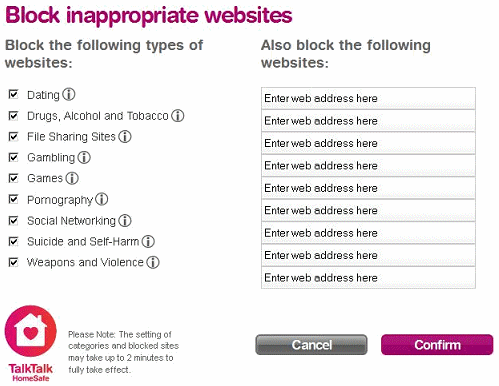Big UK ISPs Clarify the Confusion over Network Level Internet Filters
A few remarks made by the Conservative MP for Devizes, Claire Perry, to the Westminster eForum on 14th June last week have generated a significant quantity of often misleading reports suggesting that default internet filtering of adult website by UK ISPs will be introduced by early 2014. But this isn’t entirely correct.
According to Perry, “We will have filters where if you do nothing, the parental filters will come pre-ticked” and “We will have automatic put on, so if you turn the filter off at 9pm, it turns on again at 7am“. Many have interpreted this to mean that UK ISPs will enable internet censorship by default.
Advertisement
ISPreview.co.uk, in an effort to clear up some of the confusion, has been busy contacting all four of the country’s largest fixed line home broadband ISPs to find out precisely what will really be happening. Suffice to say that some concerns remain unresolved but the reality isn’t as strict as Perry might have suggested.
A quick recap
Back in October 2011 BT, Sky Broadband, TalkTalk and Virgin Media all agreed to help protect children online via a new Code of Practice called Active Choice (here) that, among other things, would give customers (e.g. parents) an “enforced” option to block adult web content at the point of purchase.
In reality most ISPs, except TalkTalk’s HomeSafe service, simply used this to offer Parental Control software and that apparently wasn’t good enough for the government which began a consultation on the subject (here). The result was that only 35% of parents supported the introduction of default filtering of the internet by their ISP and a legislated approach was deemed unfavourable (here).
Never the less the government did want ISPs to do more and one of the proposals was an enhanced version of Active Choice, imaginatively nicknamed Active Choice Plus. This essentially proposed to give customers an option to opt-out of network level adult content filtering (i.e. it would come pre-ticked as enabled), which would be followed by a choice of content types (e.g. porn, social networking etc.) that could be blocked.
Advertisement
Is it really default internet censorship?
In essence what Claire Perry has proposed and what ISPs are adopting appears to be Active Choice Plus but the devil is in the detail and it’s important to understand the subtleties involved before drawing any conclusions.
Firstly we already know (since May 2013) that all of the major ISPs either have or will soon launch network level filtering by the end of 2013 (here). A “network level” solution means that the ISP controls the filtering at its end of the service and this allows the restrictions to be imposed across all your connected devices.
But will it be enabled by default? Well not quite. According to the ISPs, all customers (both new and existing) will at some point be presented with an OPTION to enable or disable the related Parental Controls. Customers that agree to this will then be presented with a list of categories or genres that they can choose to block/unblock (as above).

Virgin Media said this makes Perry’s suggestion that the filtering could be automatically enabled if you do nothing somewhat moot since the option will be presented to everybody and you won’t be able to avoid it. Virgin Media also advised that the question of whether or not “Do you want to enable filtering?” (that’s just our wording for this example) would come pre-ticked with a “Yes“, which is what Sky Broadband already intends to do (here), is “still being worked through” (Perry clearly wants it).
Advertisement
By contrast TalkTalk told us that the default setting for HomeSafe is currently set to be switched off until the customer chooses to enable it.
Extra filtering options
Virgin Media also noted that customers whom agree to the filtering will be presented with an additional prompt that explains what the choice means, although they remain concerned that adopting a pre-ticked “Yes” approach might encourage some people to “skip through without being engaged” (sleepwalking their way into censorship).
Unfortunately none of the ISPs was able to give us a clear answer about whether any of the listed categories for blocking would also come pre-ticked (it’s assumed porn would be pre-ticked). Likewise BT ducked our question entirely and told us to contact Claire Perry’s office “for clarification” if we wanted to know about their filtering system (Eh?). We asked again but have so far had no reply.
We also note that time controls will be offered by the ISPs. What this means is that you can select when the filters are switched on and when they are off (e.g. disable them at night and put them on in the daytime etc.).
Conclusion
So to summarise. The biggest four ISPs have all voluntarily agreed to adopt network level filtering and will present all customers with an option about whether or not to enable it and which categories’ it should block. This effectively mirrors what TalkTalk’s HomeSafe service has been doing for awhile.
The only real bone of contention is whether or not any of these options will come pre-ticked with a “Yes” to enable them, though you’d still be able to select “No” provided you don’t deliberately skip past it. In other words ISPs won’t switch on filtering automatically and then give you the choice later; instead NOTHING will happen until you make the choice and select which aspects it will block.
Not that any of this will do any good as these days most children can easily find out how to beat such filters within the space of just a few minutes. It’s not hard and many of the circumvention methods require practically zero technical knowledge.
It should also be said that some of the categories risk blocking far more than you might anticipate. For example, blocking “self-harm” sites could just as easily end up blocking sites that are designed to help those whom have suffered from related problems. ISPs need to be very careful here but history shows that they don’t always make the correct judgements.
Mark is a professional technology writer, IT consultant and computer engineer from Dorset (England), he also founded ISPreview in 1999 and enjoys analysing the latest telecoms and broadband developments. Find me on X (Twitter), Mastodon, Facebook, BlueSky, Threads.net and Linkedin.
« Last 10% Uncertainty Still Hampering Investment in UK Rural Broadband
















































Comments are closed